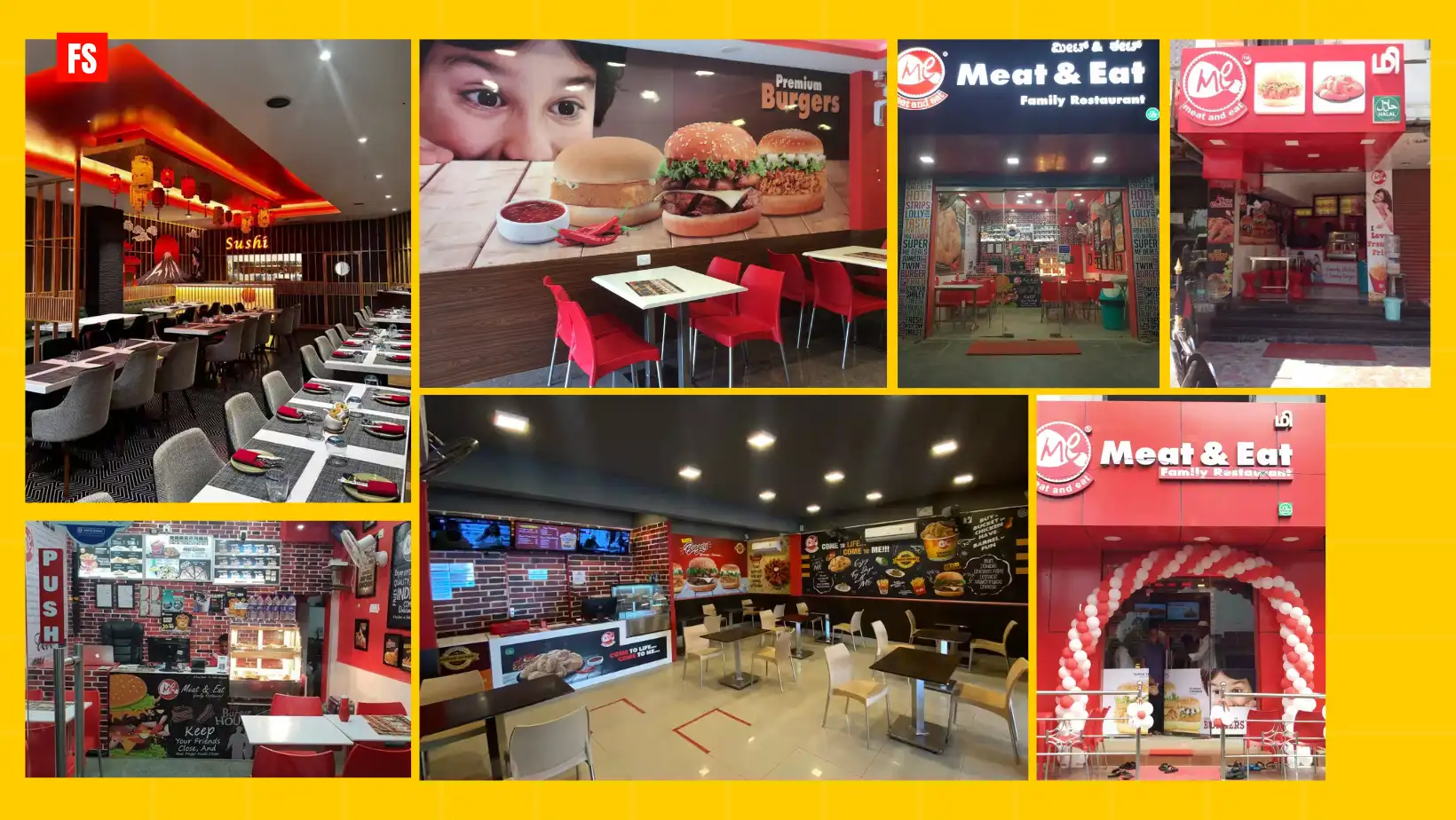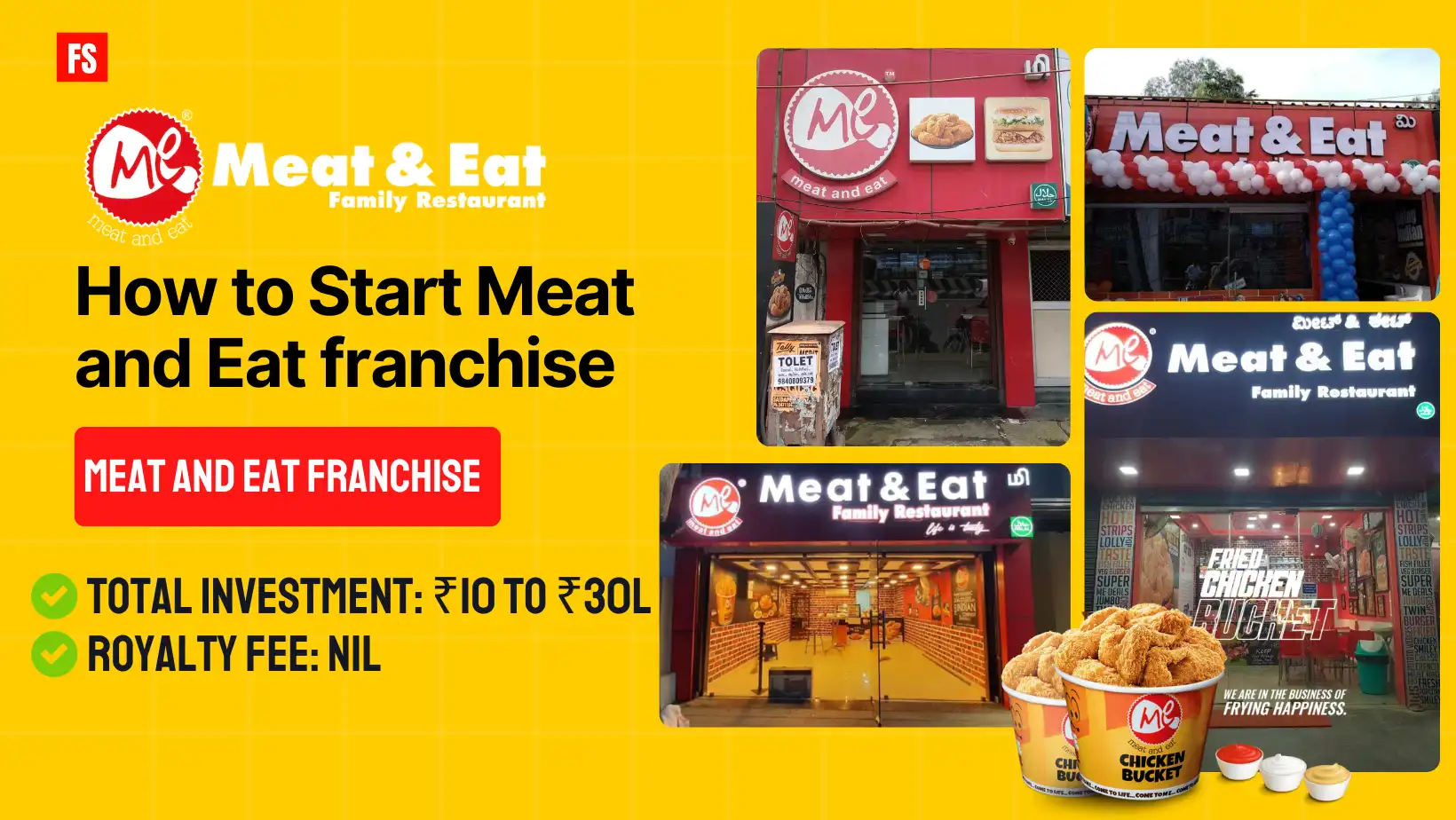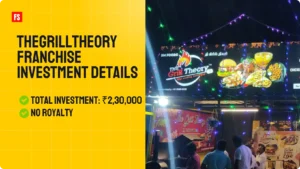For those seeking a promising business opportunity in the fast food market, the Meat and Eat franchise might be the ideal choice! In India, Meat and Eat is rapidly gaining popularity thanks to its emphasis on using only the best, freshest products and its varied menu that serves both vegetarians and non-vegetarians. A solid business strategy, loyal customers, and a dedication to quality are the foundations of the brand’s success. A Meat and Eat franchise can be an interesting investment, regardless of your level of experience as an entrepreneur.
Let’s breakdown the investment details;
Franchise Brand Details
| Brand Name: Meat and Eat |
| Founder: Kavi Groups |
| Founded Year: 2013 |
| Franchise Year: 2013 |
| Total Outlets: 300+ |
| Industry: Food and Beverage (Quick Service Restaurants) |
| Headquarters: Bangalore, Karnataka, India |
About Meat & Eat
Look no further than the Meat and Eat franchise if you’re searching for a striking success story in the Indian food industry!
Meat & Eat is a leading Indian quick-service restaurant (QSR) brand that specialises in tasty, healthy, and fresh fast food options, including vegetarian and non-vegetarian options. They use premium ingredients in every meal according to their “farm-to-fork” mentality. Meat and Eat is an expert in providing a wide variety of client favourites, including kebabs, burgers, and other delectable dishes.
They have given careful consideration to making the experience consistent and pleasurable in every outlet. Choosing a Meat and Eat franchise gives you access to a popular brand with a devoted following as well as a growing market that is hungry for high-quality fast food made with solid meat. By the end of 2023, they hope to have 1,500 locations throughout India, offering this thrilling experience to an increasing number of communities across the country.
Also Read this: Ambur Star Biryani Franchise – Royalty Fee, Profit & ROI
Why do you want to choose meat and eat franchise?
The Meat and Eat franchise ensures customer happiness and repeat business by prioritising fresh, premium ingredients and keeping to high hygienic requirements. Its organised menu provides a small but highly sought-after selection of goods, streamlining processes, cutting down on waste, and preserving constant quality. Franchisees profit from the current consumer loyalty and trust in the Meat and Eat franchise name because they are a part of a well-known brand.
Over time, the business model has been improved, reducing the risks that are usually involved with launching a new company. Meat and Eat is well-positioned to meet the rising demand for tasty, quick meals because to its fusion of Indian and foreign flavours. Franchise owners of Meat and Eat also get thorough training in customer service, marketing, and operations, along with continuing assistance to guarantee that brand standards are met.
Menus of meat and eat franchise
Meat and Eat provides a varied menu with fast food options for both vegetarians and non-vegetarians. Among their menu’s well-liked products are:
| Non- vegetarian options | Vegetarian options | Beverages |
| Chicken Tikka | Panner Tikka | Soft Drinks |
| Mutton Seekh Kebab | Veg Kebab Rolls | Fresh Juices |
| Fish Fingers et,., | Paneer Sandwiches | Milkshakes |

Market Growth of Meat and Eat brand
Over the past few years, India’s meat and chicken market has grown steadily due to factors like rising urbanisation, rising disposable incomes, and a growing need for diets high in protein. In particular, poultry has become the most popular meat option, meeting the growing need from consumers for reasonably priced and adaptable protein. The market’s upward tendency can be attributed to the consistent growth of supply chains and meat processing capacities as well as the growing base of meat consumers.
Here’s an annual breakdown of the market size in India:
2019: The market was valued at around USD 3.1 billion.
2020: Increased to around USD 3.4 billion, with a substantial amount generated by fresh meat products.
2021: An expected growth of more than 6% indicated rising demand throughout the sector. 2022: The market value is expected to reach around USD 4.0 billion, boosted by urbanisation and rising protein consumption.
2023: Valued at around USD 4.5 billion, with poultry accounting for 51.44% of total meat production.
2024 (Projected):The edible meat industry is expected to reach USD 14.39 billion, with a continued focus on poultry.
2029 (Projected): The market is expected to expand to roughly USD 16.07 billion, with a compound annual growth rate (CAGR) of 2.23% from 2024 to 2029.
Also Read this: How to Start Miniso franchise – Total investment, ROI, Royalty
Meat and Eat franchise Investment details
Getting started with a Meat and eat Franchise requires an upfront investment covering both the franchise fee and the setup of the outlet. Here’s a detailed breakdown of the costs involved:
| Total investment | ₹10 to ₹30 lakhs |
| Franchise Fee | ₹3 to ₹10 lakhs |
| Interior Setup and Equipment | ₹8 to ₹12 lakhs |
| Space Requirement | 200 to 800 sq. ft. |
| Inventory and Initial Supplies | ₹2 to ₹3 lakhs |
| Royalty Fees | None |
| Marketing and Launch Support | Approximately ₹1 lakh |
| Security Deposit | ₹2 to ₹3 lakhs |
Total Investment
A Meat and Eat franchise normally requires an initial investment of ₹10 to ₹30 lakhs. This covers all start-up and operating expenses, including the franchise fee, equipment, initial inventory, and interior setup.
Franchise Fee
For a Meat and Eat franchise, the initial franchise cost typically ranges from ₹3 to ₹10 lakhs. You are granted the permission to use the well-known Meat and Eat brand in exchange for this charge.
Interior Setup and Equipment
In order to open the restaurant, you would need to spend between ₹8 to ₹12 lakhs for furnishings, décor, signage, and the kitchen equipment. This investment makes sure your store is completely furnished and prepared to offer first-rate services.
Space Requirement
Usually needing 200 to 800 square feet, a Meat and Eat franchise is best suited for bustling business districts, malls, and shopping malls.
Inventory and Initial Supplies
Initial supplies and inventory, including food components and packaging, usually cost between ₹2 and ₹3 lakhs. You can be confident that your restaurant is supplied and operational with these items.
Royalty Fees
One of the most notable aspects of the Meat and Eat franchise is that there are no royalties involved.
Marketing and launch support
Franchisees get support with the launch and initial marketing campaigns. In addition to marketing campaigns and advertising materials to assist create awareness in your community, their fees run around one lakh.
Security Deposit
It is usually necessary to have a security deposit of between ₹2 and ₹3 lakhs.
Potential and ROI of Meat and Eat
A major consideration for franchise investors is the potential for profitability and the return on investment (ROI). Here’s a closer look at the expected ROI timeline and profit margins for a Meat and Eat Franchise:
| Profit margin | 5% to 15% |
| Break-Even Period | 12 to 18 months |
| Return on investment | 20% to 30% |
Profit and Margin
A Meat and Eat franchise’s profit margin normally falls between 5% to 15%.
Break even period
A Meat and Eat franchise typically has a break-even period of 12 to 18 months.
ROI
With a Meat and Eat franchise, franchisees can expect an annual ROI of between 20% to 30%.
How to Start Meat and Eat franchise brand
Starting a Meat and Eat franchise is a great way to tap into the booming fast food industry. Here’s how you can get started:
SITE SELECTION: Choose a prominent area with lots of foot activity (between 200 and 800 square feet).
Get ready with paperworks
Collect the required paperwork:
- Application Form for Franchises A business plan
- Proof of Identity and Address
- Legal Records (Trade Licence, Shop Act, GST Registration)
How to contact Meat and eat team for franchise
- Go to Meat and Eat’s official website.
- Get the Franchise Application Form and fill it out.
- Send in the form and all necessary supporting documentation.
- Get in touch with the franchise team if you have any questions or need help with the application process.
- Await Response: To discuss next steps and complete the agreement, anticipate a timely response from the franchise team.
Conclusion
In conclusion, for anyone wishing to get into the rapidly expanding food and beverage sector, the Meat and Eat franchise offers an exciting opportunity. It provides a strong platform for success with its powerful brand, low risk business approach, and extensive support. The Meat and Eat property is a fantastic option if you’re prepared to invest in a developing, successful company with excellent goods.
PS: Please help me improve my content, share your feedback by clicking any of the emojis below 👇
Also Read this
- Aryan Khan Net Worth – Business Ventures, Cars, & Lifestyle
- Mahindra Logistics Franchise – Investment Details, ROI, Royalty, Profit
- Bajaj Dealership Franchise – Investment Details, ROI, Profit
- Alireza Firouzja Net Worth — The Young Chess Millionaire
- Varun Dua Net Worth – How the Acko Founder to Crorepati
FAQ – Frequently Asked Questions
The franchise agreement for Meat and Eat typically lasts for 5 years, after which it can be renewed.
The initial investment for a Meat and Eat franchise ranges from ₹10 to ₹30 lakhs, covering franchise fees, interior setup, inventory, and initial supplies.
The franchise fee typically ranges from ₹3 to ₹10 lakhs, allowing you to operate under the established Meat and Eat brand.
Meat and Eat franchises typically require 200 to 800 square feet, ideally located in busy areas such as malls, business districts, or shopping centers.
Franchisees can expect an annual ROI of 20% to 30% based on current trends.
The break-even period for a Meat and Eat franchise is typically 12 to 18 months.
Meat and Eat was founded by Kavi Groups in 2013, headquartered in Bangalore, Karnataka, India.







